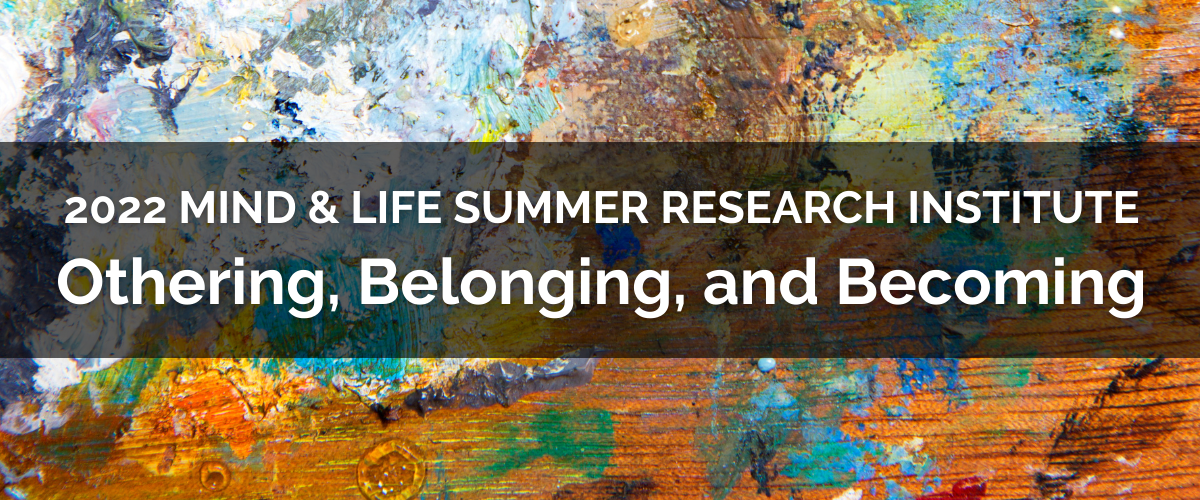The Mind & Life Education Research Network (MLERN) was formed in 2006 as a multidisciplinary intellectual forum dedicated to investigating issues at the intersection of the mind, brain, education and contemplative practice. Directed by Dr. Richard Davidson of the University of Wisconsin, MLERN included a core group of contemplatives and contemplative scholars, neuroscientists, cognitive, developmental …
Topic Archives:
2022 Summer Research Institute
SRI 2022 explores the crisis of disconnection and othering. The challenges we face—from racial injustice to conflict within and across borders to climate change—demand concerted action; yet we remain more divided than ever. What is the role of our minds in creating these divisions, and how can our minds transform to create a more connected world?
Inspiring Minds – November 2021
Our November conversation features Eric Garland and Durga Leela, with musician Geoffrey Menin. They discuss mindfulness and embodied practices for holistic healing.
Illuminating the Mind: Exploring Buddhism and Science with the Dalai Lama
Join His Holiness the Dalai Lama in an exploration of the nature of mind with leading researchers, philosophers, and Buddhist scholars in this online course, co-produced by Mind & Life and Wisdom Academy.
Master Plants and Mindful Medicine: Towards Reciprocation and Recontextualization of Indigenous Practices and Western Psychedelic Research
The new movement in psychedelics transforms ideas and practices related to mental health and the science of transcendent experience. It is on a path, though, to exclude Indigenous voices and millenary knowledge from which these medicines originate. Indigenous contemplative practices are noticeably absent in psychedelic-assisted therapies. No involvement of Indigenous Peoples determines best practices in …
The Critical Role of Behavioral Science in Climate Change
Elissa will discuss models of research for climate change mitigation. A “strategic research” (use-inspired) model starts by working with stakeholders from the outset, and helps us identify goals to impact structural change. The Science of Behavior Change initiative at the National Institutes of Health (NIH) provides a roadmap for high impact methods that also fit …
Continue reading “The Critical Role of Behavioral Science in Climate Change”
Plenary Panel: “Starting from Experience: Neurophenomenology and the Vision of Mind and Life Europe”
Research on contemplative practices and their larger context can take various pathways, but as a methodology, one key method is neurophenomenology, an approach that fully acknowledges the mutual importance of an account of experience from within experience, along with measures, such as behavioral data and brain imaging, that purport to stand outside experience. Developed especially …
Keynote and Q&A: “Understanding Human Thought Through Dynamic Brain Systems”
Mind-wandering has recently come to occupy a central position in cognitive psychology and neuroscience. Most theories and research so far have examined it in terms of task-unrelated or stimulus-independent mental contents that occur at particular moments of time. A defining feature of mind-wandering, however, are its dynamics: how thought moves over time. In this talk, …
Continue reading “Keynote and Q&A: “Understanding Human Thought Through Dynamic Brain Systems””
Inspiring Minds – April 2021
Our April conversation features Amishi Jha and Jon Kabat-Zinn, and cellist Barbara Bogatin. Learn more about the inner workings of the mind, and how to cultivate greater attention and wise action in how we conduct ourselves individually and collectively.
Coping with Loneliness & Stress: The Role of Mindful Acceptance
Even before the coronavirus hit, the United States was considered one of the most stressed out countries in the world. Fear and anxiety brought on by the pandemic has only exacerbated the problem, with 8 out of 10 adults citing the pandemic as a significant source of stress in their lives. Researchers have been studying …
Continue reading “Coping with Loneliness & Stress: The Role of Mindful Acceptance”






